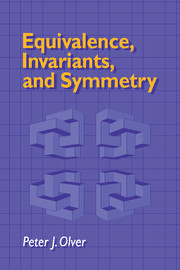Book contents
- Frontmatter
- Contents
- Preface
- Acknowledgments
- Introduction
- 1 Geometric Foundations
- 2 Lie Groups
- 3 Representation Theory
- 4 Jets and Contact Transformations
- 5 Differential Invariants
- 6 Symmetries of Differential Equations
- 7 Symmetries of Variational Problems
- 8 Equivalence of Coframes
- 9 Formulation of Equivalence Problems
- 10 Cartan's Equivalence Method
- 11 Involution
- 12 Prolongation of Equivalence Problems
- 13 Differential Systems
- 14 Frobenius' Theorem
- 15 The Cartan–Kähler Existence Theorem
- Tables
- References
- Symbol Index
- Author Index
- Subject Index
11 - Involution
Published online by Cambridge University Press: 05 August 2012
- Frontmatter
- Contents
- Preface
- Acknowledgments
- Introduction
- 1 Geometric Foundations
- 2 Lie Groups
- 3 Representation Theory
- 4 Jets and Contact Transformations
- 5 Differential Invariants
- 6 Symmetries of Differential Equations
- 7 Symmetries of Variational Problems
- 8 Equivalence of Coframes
- 9 Formulation of Equivalence Problems
- 10 Cartan's Equivalence Method
- 11 Involution
- 12 Prolongation of Equivalence Problems
- 13 Differential Systems
- 14 Frobenius' Theorem
- 15 The Cartan–Kähler Existence Theorem
- Tables
- References
- Symbol Index
- Author Index
- Subject Index
Summary
We now turn to the cases when the Cartan equivalence procedure, as presented so far, does not lead to a complete reduction of the structure group. Thus, we may assume that, after perhaps one or more loops through the absorption and reduction algorithm, we are left with a coframe that still involves one or more of the original group parameters, yet none of the remaining essential torsion coefficients depend explicitly on the group parameters. Therefore, the method fails to produce any further invariant combinations of variables and group parameters that will allow us to normalize the remaining group parameters in a consistent manner. The question is then: What do we do now?
Why might we expect such a situation to arise? Consider the possible symmetry groups of an equivalence problem. If the Cartan method leads to a complete reduction, resulting in an invariant coframe 0, then the associated symmetry group is, as we have seen, an (m – r)- dimensional Lie group, where m is the dimension of the underlying manifold (or number of coframe elements) and r is the rank of the coframe, or number of functionally independent structure functions — see Theorem 8.22. Consequently, the dimension of the symmetry group can never exceed the dimension of the manifold on which the problem is formulated as a Cartan equivalence problem. On the other hand, we have already encountered a number of equivalence problems wherein the symmetry group has a larger dimension than the space on which the problem is most naturally formulated.
Information
- Type
- Chapter
- Information
- Equivalence, Invariants and Symmetry , pp. 347 - 371Publisher: Cambridge University PressPrint publication year: 1995
